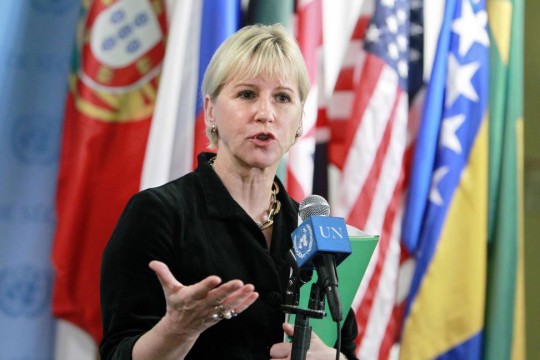DR Congo: UN envoy on sexual violence in conflict welcomes sanctioning of militia leader
DR Congo: UN envoy on sexual violence in conflict welcomes sanctioning of militia leader
Special Representative on Sexual Violence in Conflict Margot Wallstrom
1 December 2011 –
Margot Wallstrom, the Secretary-General’s Special Representative on Sexual Violence in Conflict, said Ntabo Ntaberi Sheka, a political leader of one of DRC’s Mayi Mayi militia groups, planned and the ordered mass rapes in Walikale territory the country’s North Kivu province last year.
She said the decision by the Council’s sanctions committee concerning DRC “sends a clear and resounding signal that impunity for such crimes will not be tolerated and that the international community is prepared to use all means at its disposal to go after the perpetrators.
“The worldwide travel ban and assets freeze imposed by Security Council resolution 1533 will limit the room for manoeuvre for Sheka and other commanders responsible for human rights violations.”
Ms. Wallstrom said her office will continue to monitor sexual violence in the DRC and other areas and to stand in solidarity with survivors.
The Council’s sanctions committee concerning DRC added Mr. Sheka to its travel ban and assets freeze list on Monday, saying he had also committed serious violations of international law involving the targeting of children.
“Ntabo Ntaberi Sheka planned and ordered a series of attacks in Walikale territory from July 30 to August 2, 2010 to punish local populations accused of collaborating with Congolese Government forces,” the committee said in a press release.
“In the course of the attacks, children were raped and were abducted, subjected to forced labour, and subjected to cruel, inhumane, or degrading treatment. The Mayi Mayi Sheka militia group also forcibly recruits boys and holds children in their ranks from recruitment drives,” it added.
###
> United Nations (UN).
 The United Nations was established on 24 October 1945 by 51 countries committed to preserving peace through international cooperation and collective security. Today, nearly every nation in the world belongs to the UN: membership totals 192 countries.
The United Nations was established on 24 October 1945 by 51 countries committed to preserving peace through international cooperation and collective security. Today, nearly every nation in the world belongs to the UN: membership totals 192 countries.
When States become Members of the United Nations, they agree to accept the obligations of the UN Charter, an international treaty that sets out basic principles of international relations. According to the Charter, the UN has four purposes:
- to maintain international peace and security;
- to develop friendly relations among nations;
- to cooperate in solving international problems and in promoting respect for human rights;
- and to be a centre for harmonizing the actions of nations.
###
* The above story is adapted from materials provided by United Nations (UN)
** More information at United Nations (UN)





















